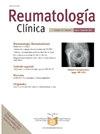Factors associated with patient-reported outcome measures in knee osteoarthritis: A cross-sectional community-based study
IF 1.3
Q4 RHEUMATOLOGY
引用次数: 0
Abstract
Introduction and objective
Knee pain resulting from osteoarthritis (OA) often leads to functional limitations and disabilities, significantly affecting an individual's quality of life. This study aimed to explore the factors associated with patient-reported outcome measures in knee OA.
Methods
A cross-sectional study was conducted using data from the Community Oriented Program for Control of Rheumatic Diseases (COPCORD) study in Jakarta. A home-to-home survey using multistage stratified random sampling was conducted involving subjects who met the clinical criteria for knee OA. Data collected included demographic information, body height and weight, history of injury, degree of work activities, presence of body aches and joint pain, and comorbidities. Patient-reported knee outcomes were assessed using the Knee Injury and Osteoarthritis Outcome Score (KOOS). Bivariate and multivariate analyses were performed to identify factors associated with KOOS and its subscales.
Results
A total of 71 subjects meeting the clinical criteria for knee OA were included in the analysis, with a mean age of 54.54 ± 9.97 years. Cardiovascular disease was significantly associated with overall KOOS scores and all five subscales. Additionally, OA subjects with a history of knee injury scored worse specifically on the KOOS quality of life subscale.
Conclusion
Cardiovascular disease and a history of knee injury were significantly associated with worse patient-reported knee outcomes among knee OA subjects. Future studies involving more cities are recommended to confirm these findings and provide more robust results for the Indonesian population.
与膝骨关节炎患者报告的结果测量相关的因素:一项基于社区的横断面研究
由骨关节炎(OA)引起的膝关节疼痛通常会导致功能限制和残疾,严重影响个人的生活质量。本研究旨在探讨与膝关节OA患者报告的预后指标相关的因素。方法采用雅加达面向社区的风湿病控制项目(COPCORD)研究数据进行横断面研究。采用多阶段分层随机抽样对符合膝关节OA临床标准的受试者进行了一项挨家挨户的调查。收集的数据包括人口统计信息、身高和体重、受伤史、工作活动程度、身体疼痛和关节疼痛的存在以及合并症。使用膝关节损伤和骨关节炎预后评分(oos)评估患者报告的膝关节预后。进行双变量和多变量分析以确定与oos及其子量表相关的因素。结果符合膝关节炎临床标准的患者71例纳入分析,平均年龄54.54±9.97岁。心血管疾病与kos总分和所有五个分量表显著相关。此外,有膝关节损伤史的OA受试者在oos生活质量亚量表上的得分更差。结论:在膝关节炎患者中,心血管疾病和膝关节损伤史与患者报告的较差的膝关节预后显著相关。建议在未来开展涉及更多城市的研究,以证实这些发现,并为印度尼西亚人口提供更有力的结果。
本文章由计算机程序翻译,如有差异,请以英文原文为准。
求助全文
约1分钟内获得全文
求助全文
来源期刊

Reumatologia Clinica
RHEUMATOLOGY-
CiteScore
2.40
自引率
6.70%
发文量
105
审稿时长
54 days
期刊介绍:
Una gran revista para cubrir eficazmente las necesidades de conocimientos en una patología de etiología, expresividad clínica y tratamiento tan amplios. Además es La Publicación Oficial de la Sociedad Española de Reumatología y del Colegio Mexicano de Reumatología y está incluida en los más prestigiosos índices de referencia en medicina.
 求助内容:
求助内容: 应助结果提醒方式:
应助结果提醒方式:


